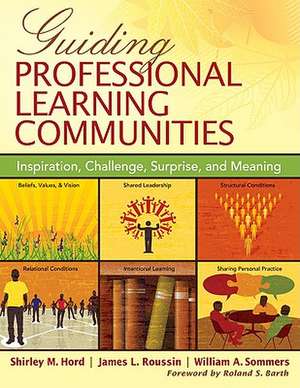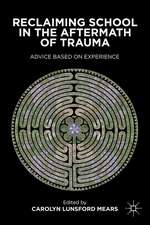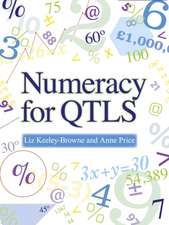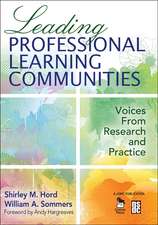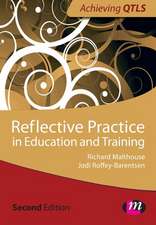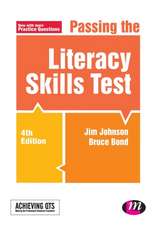Guiding Professional Learning Communities: Inspiration, Challenge, Surprise, and Meaning
Autor Shirley M. Hord, Jim Roussin, William A. Sommersen Limba Engleză Paperback – 21 dec 2009
Preț: 293.21 lei
Nou
Puncte Express: 440
Preț estimativ în valută:
56.10€ • 58.74$ • 46.42£
56.10€ • 58.74$ • 46.42£
Carte tipărită la comandă
Livrare economică 05-19 aprilie
Preluare comenzi: 021 569.72.76
Specificații
ISBN-13: 9781412972710
ISBN-10: 141297271X
Pagini: 240
Dimensiuni: 216 x 279 x 18 mm
Greutate: 0.66 kg
Ediția:New.
Editura: SAGE Publications
Colecția Corwin
Locul publicării:Thousand Oaks, United States
ISBN-10: 141297271X
Pagini: 240
Dimensiuni: 216 x 279 x 18 mm
Greutate: 0.66 kg
Ediția:New.
Editura: SAGE Publications
Colecția Corwin
Locul publicării:Thousand Oaks, United States
Recenzii
“Although
research
on
the
effectiveness
of
professional
learning
communities
(PLCs)
can
best
described
as
‘mixed,’
one
thing
is
clear:
they
accomplish
nothing
without
strong,
knowledgeable,
and
courageous
leadership.
To
improve
teaching
quality
and
student
learning
outcomes,
someone
has
to
take
the
reins
and
lead
the
effort
with
intelligence,
skill,
sensitivity,
and
a
clear
sense
of
purpose.
This
book
offers
the
‘why’
and
the
‘how’
to
those
willing
to
take
on
the
challenge.”
"One weekend morning, I sat down with my cup of coffee to read a book, and much to my delight, two hours later, I had not read a book, but rather mapped out a learning plan for an entire year. The best gift of all, everything I will need is right here in this book. When you sit down to read this book, make sure you have a calendar at your side. Get ready to go on a shopping spree of ideas; like all good shoppers choose wisely, for there is no way you can possibly use all of the ideas in this book in one year. I assure you, you will not have buyer’s remorse!"
“Too often PLCs are treated as events. The authors of this fine book make clear that an authentic PLC is neither an event nor a name. It is about embracing a form of leadership and learning in schools that requires fearless examination of teaching practices, faculty interactions, and student learning toward the goal of increased successful student learning. The book is so rich with information, resources, and learning activities revealing how this can be accomplished that it could serve as syllabus for a graduate course in school improvement.”
"One weekend morning, I sat down with my cup of coffee to read a book, and much to my delight, two hours later, I had not read a book, but rather mapped out a learning plan for an entire year. The best gift of all, everything I will need is right here in this book. When you sit down to read this book, make sure you have a calendar at your side. Get ready to go on a shopping spree of ideas; like all good shoppers choose wisely, for there is no way you can possibly use all of the ideas in this book in one year. I assure you, you will not have buyer’s remorse!"
“Too often PLCs are treated as events. The authors of this fine book make clear that an authentic PLC is neither an event nor a name. It is about embracing a form of leadership and learning in schools that requires fearless examination of teaching practices, faculty interactions, and student learning toward the goal of increased successful student learning. The book is so rich with information, resources, and learning activities revealing how this can be accomplished that it could serve as syllabus for a graduate course in school improvement.”
Cuprins
Foreword
by
Roland
S.
Barth
Acknowledgments
About the Authors
Part I. Introduction: Things You Need to Know Before You Use This Book
Part II. Words to the Wise: Before You Begin
Part III. Learning Opportunities: Tools, Tasks, Deep Thinking, and a Wee Bit of Trivia
Learning Opportunity 0.1: A Crisp Rationale for PLCs
Learning Opportunity 0.2: Benefits to Staff and to Students: A Flamingo Dialogue
Learning Opportunity 0.3: Research-Based Components of a PLC: A Jigsaw
Component 1: Shared Beliefs, Values, and Vision
Overview and Current Thinking
Learning Opportunity 1.1: My Personal Learning Compass
Learning Opportunity 1.2: Creating a Culture of Academic Optimism
Learning Opportunity 1.3: Prioritized Abandonment
Learning Opportunity 1.4: Discovering Our Core Values
Component 2: Shared and Supportive Leadership
Overview and Current Thinking
Learning Opportunity 2.1: Friendly Feedback for the Principal
Learning Opportunity 2.2: A Guide for Making Decisions
Learning Opportunity 2.3: Learning Conversations
Learning Opportunity 2.4: Planting the PLC in a Strong Culture
Learning Opportunity 2.5: Positive Deviance
Learning Opportunity 2.6: Distributed Leadership
Component 3: Structural Conditions
Overview and Current Thinking
Learning Opportunity 3.1: Time and Other Essential Ingredients
Learning Opportunity 3.2: Assessing the Effectiveness of PLC Meetings
Learning Opportunity 3.3: Assessment for PLC Development
Learning Opportunity 3.4: The Learning Community’s WORK
Learning Opportunity 3.5: Identifying a PLC Learning Goal
Learning Opportunity 3.6: Traffic Light Indicator
Component 4: Relational Conditions
Overview and Current Thinking
Learning Opportunity 4.1: The Importance of Trust in the PLC
Learning Opportunity 4.2: Group Development
Learning Opportunity 4.3: Mapping Collaborative Interactions
Learning Opportunity 4.4: Relational Conditions
Learning Opportunity 4.5: Building Consensus
Learning Opportunity 4.6: Defusing Conflict in a PLC
Component 5: Intentional Collective Learning and Its Application
Overview and Current Thinking
Learning Opportunity 5.1: Leadership and the Enemies of Learning
Learning Opportunity 5.2: Twelve Principles for Effective Adult Learning
Learning Opportunity 5.3: The PLC Action Plan
Learning Opportunity 5.4: Listening Together in the PLC
Learning Opportunity 5.5: Using the Stages of Concern to Connect Professional Learning to the Classroom
Learning Opportunity 5.6: Using the Levels of Use (LoU) to Connect Professional Learning to the Classroom
Learning Opportunity 5.7: PLC Growth Development Profile
Component 6: Sharing Personal Practice
Overview and Current Thinking
Learning Opportunity 6.1: “Foursight” for Learning: Four Focus Areas to Consider in Monitoring for Student Learning
Learning Opportunity 6.2: Four Conversations
Learning Opportunity 6.3: Coaching: Transferring Adult Learning to the Classroom or What’s Learned Here Leaves Here
Learning Opportunity 6.4: Reflection Protocols
Learning Opportunity 6.5: Video Sharing Protocol
Part IV. Bringing Closure
Resource A
References
Index
Acknowledgments
About the Authors
Part I. Introduction: Things You Need to Know Before You Use This Book
Part II. Words to the Wise: Before You Begin
Part III. Learning Opportunities: Tools, Tasks, Deep Thinking, and a Wee Bit of Trivia
Learning Opportunity 0.1: A Crisp Rationale for PLCs
Learning Opportunity 0.2: Benefits to Staff and to Students: A Flamingo Dialogue
Learning Opportunity 0.3: Research-Based Components of a PLC: A Jigsaw
Component 1: Shared Beliefs, Values, and Vision
Overview and Current Thinking
Learning Opportunity 1.1: My Personal Learning Compass
Learning Opportunity 1.2: Creating a Culture of Academic Optimism
Learning Opportunity 1.3: Prioritized Abandonment
Learning Opportunity 1.4: Discovering Our Core Values
Component 2: Shared and Supportive Leadership
Overview and Current Thinking
Learning Opportunity 2.1: Friendly Feedback for the Principal
Learning Opportunity 2.2: A Guide for Making Decisions
Learning Opportunity 2.3: Learning Conversations
Learning Opportunity 2.4: Planting the PLC in a Strong Culture
Learning Opportunity 2.5: Positive Deviance
Learning Opportunity 2.6: Distributed Leadership
Component 3: Structural Conditions
Overview and Current Thinking
Learning Opportunity 3.1: Time and Other Essential Ingredients
Learning Opportunity 3.2: Assessing the Effectiveness of PLC Meetings
Learning Opportunity 3.3: Assessment for PLC Development
Learning Opportunity 3.4: The Learning Community’s WORK
Learning Opportunity 3.5: Identifying a PLC Learning Goal
Learning Opportunity 3.6: Traffic Light Indicator
Component 4: Relational Conditions
Overview and Current Thinking
Learning Opportunity 4.1: The Importance of Trust in the PLC
Learning Opportunity 4.2: Group Development
Learning Opportunity 4.3: Mapping Collaborative Interactions
Learning Opportunity 4.4: Relational Conditions
Learning Opportunity 4.5: Building Consensus
Learning Opportunity 4.6: Defusing Conflict in a PLC
Component 5: Intentional Collective Learning and Its Application
Overview and Current Thinking
Learning Opportunity 5.1: Leadership and the Enemies of Learning
Learning Opportunity 5.2: Twelve Principles for Effective Adult Learning
Learning Opportunity 5.3: The PLC Action Plan
Learning Opportunity 5.4: Listening Together in the PLC
Learning Opportunity 5.5: Using the Stages of Concern to Connect Professional Learning to the Classroom
Learning Opportunity 5.6: Using the Levels of Use (LoU) to Connect Professional Learning to the Classroom
Learning Opportunity 5.7: PLC Growth Development Profile
Component 6: Sharing Personal Practice
Overview and Current Thinking
Learning Opportunity 6.1: “Foursight” for Learning: Four Focus Areas to Consider in Monitoring for Student Learning
Learning Opportunity 6.2: Four Conversations
Learning Opportunity 6.3: Coaching: Transferring Adult Learning to the Classroom or What’s Learned Here Leaves Here
Learning Opportunity 6.4: Reflection Protocols
Learning Opportunity 6.5: Video Sharing Protocol
Part IV. Bringing Closure
Resource A
References
Index
Notă biografică
Shirley M. Hord, PhD, is the scholar laureate of Learning Forward (previously National Staff Development Council), following her retirement as Scholar Emerita at the Southwest Educational Development Laboratory in Austin, Texas. There she directed the Strategies for Increasing Student Success Program. She continues to design and coordinate professional development activities related to educational change and improvement, school leadership, and the creation of professional learning communities.
Her early roles as elementary school classroom teacher and university science education faculty at The University of Texas at Austin were followed by her appointment as co-director of Research on the Improvement Process at the Research and Development Center for Teacher Education at The University of Texas at Austin. There she administered and conducted research on school improvement and the role of school leaders in school change.
She served as a fellow of the National Center for Effective Schools Research and Development and was U.S. representative to the Foundation for the International School Improvement Project, an international effort that develops research, training, and policy initiatives to support local school improvement practices.
In addition to working with educators at all levels across the U.S. and Canada, Hord makes presentations and consults in Asia, Europe, Australia, Africa, and Mexico.
Her current interests focus on the creation and functioning of educational organizations as learning communities and the role of leaders who serve such organizations. Dr. Hord is the author of numerous articles and books, of which a selection of the most recent are: Implementing Change: Patterns, Principles, and Potholes, 3rd ed (with Gene E. Hall, 2011); Reclaiming Our Teaching Profession: The Power of Educators Learning in Community (with Edward F. Tobia, 2012); A Playbook for Professional Learning: Putting the Standards Into Action (with Stephanie Hirsh, 2012).
Her early roles as elementary school classroom teacher and university science education faculty at The University of Texas at Austin were followed by her appointment as co-director of Research on the Improvement Process at the Research and Development Center for Teacher Education at The University of Texas at Austin. There she administered and conducted research on school improvement and the role of school leaders in school change.
She served as a fellow of the National Center for Effective Schools Research and Development and was U.S. representative to the Foundation for the International School Improvement Project, an international effort that develops research, training, and policy initiatives to support local school improvement practices.
In addition to working with educators at all levels across the U.S. and Canada, Hord makes presentations and consults in Asia, Europe, Australia, Africa, and Mexico.
Her current interests focus on the creation and functioning of educational organizations as learning communities and the role of leaders who serve such organizations. Dr. Hord is the author of numerous articles and books, of which a selection of the most recent are: Implementing Change: Patterns, Principles, and Potholes, 3rd ed (with Gene E. Hall, 2011); Reclaiming Our Teaching Profession: The Power of Educators Learning in Community (with Edward F. Tobia, 2012); A Playbook for Professional Learning: Putting the Standards Into Action (with Stephanie Hirsh, 2012).
Descriere
This
sequel
to
Leading
Professional
Learning
Communities
focuses
on
the
practical
process
of
implementing,
improving,
and
sustaining
Professional
Learning
Communities.
